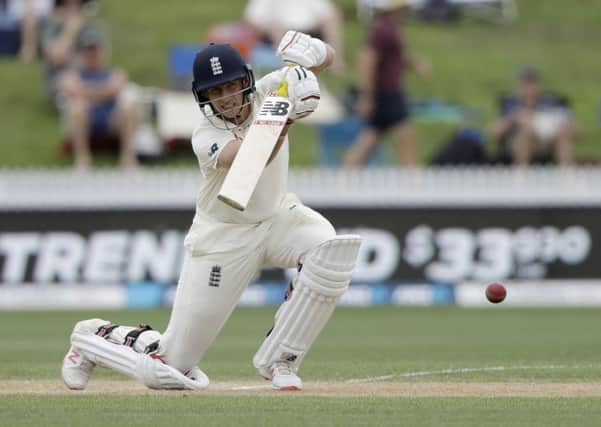Classy century sees England’s Joe Root keep hold of his seat at Captain’s table


Boy, we’ve missed you.
In Joe Root’s case, it had been nine long months since his last Test hundred, a sequence ended by his three-figure innings against New Zealand in Hamilton.
In the case of David Warner, the Australia batsman who put a far worse sequence of form behind him to score an unbeaten triple century against Pakistan in Adelaide at the weekend, the words “form is temporary, class is permanent” are even more apposite.


Advertisement
Hide AdAdvertisement
Hide AdThat said, the words “class” and “David Warner” should not really appear together in the same sentence.
Better to say, perhaps, that Warner has returned to form following an Ashes campaign in which he scored just 95 runs in 10 innings at 9.50, with 61 of those runs coming in one innings.
While Warner celebrated his 23rd Test century in the pink ball Test (or, to be more accurate, “over-celebrated” it), Root notched his 17th at Seddon Park, his sixth as captain, and his slowest in terms of balls faced (259).
The man whom Warner once punched in a Birmingham nightclub (classy, eh) celebrated with a punch of his own into the fresh New Zealand air.


Root needed that hundred – and so did his team.
Advertisement
Hide AdAdvertisement
Hide AdBy stumps on day three, the Yorkshireman had 114 and England were 269-5 in reply to New Zealand’s 375, the match in the balance and the weather forecast uncertain.
The critics had started to circle above Root and although it will take more than one innings on a docile batting surface to bat them off completely, this innings will at least ensure that he leads England to South Africa shortly with his game in much better order after a tentative showing in last week’s first Test.
Prior to this match, Root had said that the captaincy was not affecting his batting, a comment that was clearly unsupported by statistics.
They showed that Root’s average as captain had dipped below 40 whereas, as batsman alone, it soared high above 50, placing him at the game’s top table.
Advertisement
Hide AdAdvertisement
Hide AdTo be fair to him, of course, Root could hardly have announced – after also dropping out of the top-10 world batting rankings for the first time in more than five years – that the captaincy was having a deleterious effect.
“Yes, my batting is suffering because of the captaincy and I think that the stats show that” – were words that were never going to fall from his lips at his pre-match press conference.
To these eyes, though, it would be slightly odd if the captaincy was not affecting his batting; after all, Root has not exactly had a well-oiled machine at his disposal in recent times.
As the team’s best batsman (apologies to those who advocate Ben Stokes for that laurel), there is a lot on his plate and the burden has not been difficult to detect in his face and general demeanour.
Advertisement
Hide AdAdvertisement
Hide AdRoot has always been a superb ambassador for county and country, but he has looked like a strained ambassador for quite some time.
Realistically, the only man who could take over from him as captain is Rory Burns, with whom he shared a fine partnership in Hamilton as the Surrey captain scored 101, unless Jos Buttler confirms his place in the team.
Burns has done as well as anyone handed the poisoned chalice left by the departures of Alastair Cook and Andrew Strauss, but he had some fortune in Hamilton and remains a work in progress at Test level. In an ideal world, someone else could captain and Root could concentrate solely on his batting, but the paucity of alternatives is glaringly clear.
England would be loath to risk blunting Stokes’s effectiveness by handing him the job; witness what happened to Ian Botham in the 1980s.
Advertisement
Hide AdAdvertisement
Hide AdAt the same time, as the official vice-captain, one assumes that Stokes would step in if Root was ill or injured, so there is perhaps a contradiction there in England’s approach.
Above anything else, England need Root for his runs, just as New Zealand need them from his one-time Yorkshire team-mate Kane Williamson, Australia from Steve Smith and India from Virat Kohli.
Root’s membership of this so-called “Big Four” had rather lapsed of late; this century renewed it and confirmed that he will be attending the Christmas bash after all.
“Form is temporary, class is permanent, eh lads?”